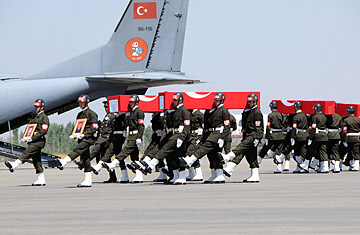
Turkish soldiers carry the coffins of soldiers who were killed in an attack by members of the PKK during funerals in Van, on August 18, 2011.
A sharp escalation in fighting between Turkey and the Kurdish separatist PKK over the past three weeks has bucked the trend of recent years that saw Turkey inching towards a peaceful solution to three decades of conflict with its restive Kurdish minority. The government of Prime Minister Recep Tayyip Erdogan had eased efforts to snuff out the Kurdish language and culture, and once-banned Kurdish music, literature and television flourished. Turkish authorities even took the once unthinkable step of holding secret talks abounding to ending the fighting with Abdullah Ocalan, the jailed PKK leader that Turkey would gladly have hanged after his capture in 1999 if it hadn't been seeking to join the European Union which forbids the death penalty. And in June, a record 36 deputies from a pro-Kurdish party were elected to parliament.
But courts later barred several of those MPs from taking office, deadly PKK attacks are on the rise in recent weeks, and Turkey is reviving a hardline stance many thought had been buried. Fighter jets began bombing PKK positions in northern Iraq's autonomous Kurdish region on Wednesday, following a PKK ambush that killed eight Turkish soldiers. The Turkish military has lost some 40 soldiers this month to PKK attacks, and pro-government newspapers have begun entertaining a 'Sri Lankan model' — a massive military blitz akin to the one that destroyed Sri Lanka's Tamil Tiger insurgency at a cost of hundreds of lives, aimed at destroying the PKK in the Kurdish southeast and the northern Iraqi mountains.
Erdogan hinted that elected Kurdish politicians could be rounded up. He refuses to speak to Kurdish party deputies, and will not include them in the critical discussions over drafting a new, more democratic constitution — even though the status of the countries 15-20 million Kurds was a key concern in the framing of the next constitution. But the potential consequences of a violent government crackdown are worrying — especially against the backdrop of the Arab Spring. The PKK enjoys huge support in the Kurdish southeast where tens of thousands take to the streets at a moment's notice when called upon.
"The government believes this is containable," says Soli Ozel, professor of international relations at Istanbul's Kadir Has University. "My concern is about the violence we could see in cities. There are so many unknown variables its hard to know what is really happening. Why did the PKK step up its attacks? Why has Erdogan decided to become hardline? How is this related to what's happening with Syria and Iran?" (Both of those countries, as well as Iraq, have substantial Kurdish minorities of their own.)
Some Turkish observers blame the recent wave of PKK attacks on Syria, which shares an 840km border with Turkey, arguing that the regime of President Bashar al-Assad is tacitly backing the rebels in response to Erdogan turning against his former ally. (Syria had during the mid-1990s allowed Ocalan to operate from Lebanon's Bekaa Valley, then under Syrian control, during a previous round of Syrian-Turkish tensions.) Erdogan warned on Thursday that he considered the unrest in Syria part of Turkey's "internal affairs".
The regional picture is more complicated: Syria's key ally, Iran, has in recent weeks suddenly stepped up its own attacks on PJAK, the PKK's Iranian wing. The U.S., which needs Turkey to do the heavy lifting on Syria, is expected to back Ankara's stance on the PKK. "I think Turkey has America's complete support regarding the PKK," says Soli Ozel. "The US is so dependent on Turkish backing when to comes to Syria and Iraq, I don't think they will think twice about writing the PKK off." (Indeed, the PKK is listed by the U.S. State Department as a terrorist organization.) The Iraqi Kurdish leadership, a close US ally, has been largely silent on recent Turkish airstrikes on their region, and has previously cooperated with Turkish military efforts against the PKK.
Erdogan is in a strong domestic political position, having won reelection by a convincing margin in June, and appearing to have prevailed in a showdown with the top military brass earlier this month. But any hopes that Erdogan's rise and the military's decline in political influence would bring a political solution to the Kurdish issue have been dashed by the prime minister's hawkish rhetoric. His immediate plans include more air strikes, drone attacks and the re-introduction of specially empowered police teams to control the southeast. Human rights groups accused these paramilitary units of widespread abuses during the 1990s.
"You can see that the government hasn't really internalised the idea of a peaceful solution," says Mustafa Gundogdu, Turkey and Iraq desk officer at the Kurdish Human Rights Project in London. "There is no commitment. Before this they were constantly hedging. Now they think they can end it using the military and the police."
Renewed conflict with the PKK brings with it a wearying sense of déjà vu for many Turks. Much of the '90s was taken up with a dirty war against the PKK during which thousands of people were killed, villages were torched and human rights abuses abounded. And the conflict did not end with the capture of Ocalan. "We're doing the same thing we've done so many times in the recent past," wrote Ismet Berkan in the mainstream daily Hurriyet. "Yet we believe this time will produce a different result." The difference, this time, may be that the calculations have changed in Syria, Iraq and Iran. The fate of Turkey's Kurds may to some extent rest not only on Ankara's decisions but also on those made in Damascus, Tehran and Erbil. And the consequences of decision made in any of those cities will certainly have an impact in the others.
